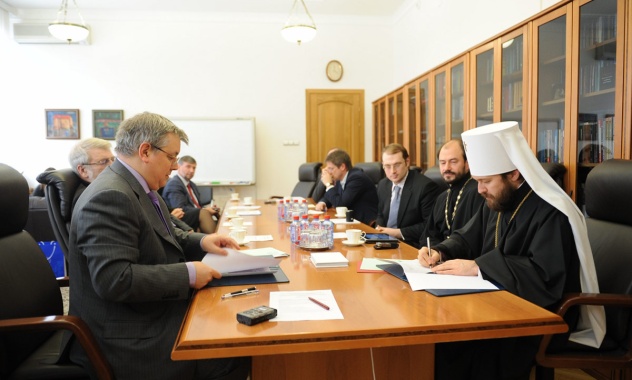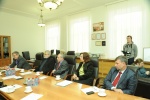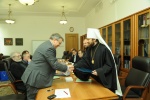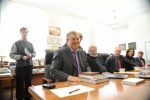Metropolitan Hilarion of Volokolamsk visits National Research University ‘Higher School of Economics’
On February 9, 2012, Metropolitan Hilarion of Volokolamsk, head of the Moscow Patriarchate’s department for external church relations and rector of the Sts Cyril and Methodius Post-Graduate and Doctoral School, visited the National Research University ‘Higher School of Economic’s (HSE).
His Eminence Hilarion had a talk there with HSE President Ya. Kuzminov. Participating in the meeting were representatives of the Church Post-Graduate and Doctoral School including Archpriest Vladimir Shmaliy, pro-rector of the school, and A. Mramornov, secretary of its academic council. The HSE was represented by L. Yakobson, first deputy rector, V. Radaev, first deputy rector, S. Roshchin, pro-rector for education, A. Rutkevich, dean of the department of philosophy, A. Kamensky, dean of the department of history, Ms O. Moshkova, director for international cooperation, and Ms T. Meshkova, assistant to the president.
Addressing the HSE president, Metropolitan Hilarion stated that the HSE had a reputation as one of the leading universities in the Russian Federation and a leader in socio-humanitarian education based on cutting-edge achievements in educational technologies.
The archpastor spoke about the Church Post-Graduate and Doctoral School, which is only three years-old. ‘This educational institution was established during the first session of the Holy Synod to be chaired by His Holiness Patriarch Kirill of Moscow and All Russia. It was founded on the basis of an earlier school, the graduate school of the Moscow Theological Academy accommodated in the building of the Department for External Church Relation. I was charged with directing the newly-established post-graduate school, while directing the DECR. Though these two church institutions are independent, there is a relationship between them expressed in the existence of a chair of external church relations in the Church Post-Graduate School, and we attach a special importance to church diplomacy’, he said.
Metropolitan Hilarion spoke about several courses offered by the Post-Graduate School including a Candidate’s program, a three-year course resulting in writing a thesis for the Candidate’s degree, and a Doctor’s course requiring of a student to write a Doctor’s thesis. ‘For the first time a Doctor’s course has been established in the Russian Orthodox Church. Until recently the Doctor’s degree existed in our Church as an honorary one which did not presuppose the defence of a thesis’, he added.
Along with that, the Church Post-Graduate School working together with some Western universities has developed a PhD program, thus offering an opportunity for granting the degree of doctor of philosophy both by the Post-Graduate School and the partner university with which an appropriate agreement has been signed. Among such education institutions are the University of Freiburg (Switzerland), the University of Durham (Great Britain), the Free University of Amsterdam (Netherlands) and a number of universities in Western countries.
There is also a MA course training future students of the Post-Graduate School and a refresher course lasting for two weeks and intended for various groups of the clergy. Recently a two-week refresher course was conducted for young bishops of the Russian Church on the theme ‘Church-state relations in Russia’. The Church Post-Graduate School and the Moscow Engineering and Physics Institute have organized courses for those who teach natural sciences in theological academies and seminaries.
Metropolitan Hilarion outlined possible ways of cooperation with the HSE. First, it is experts’ work and exchange of information about innovative technologies and various achievements in the sphere of education; secondly, a joint MA program; thirdly, cooperation in PhD programs; fourthly, joint research projects; and finally, joint actions in international cooperation.
Mr Kuzminov, on his part, stated his willingness for cooperation in these areas and proposed, along with them, to hold together broad discussions on pressing issues, especially, the problem of public morality. ‘I believe the economic progress and the stability of a state are determined by the condition of public morality shared or not shared by particular elites and by the extent to which citizens are involved in particular problems and are ready to help resolve them and to trust one another’, the HSE rector said. He stated that cooperation in this area could help overcome divisions in the society, which he compared to the confrontation between nationalists and westernizers in the 19th centiury.
The HSE president also showed interest in the participation of the Russian Orthodox Church in the work on a reform of the educational system, saying, ‘Our school has lost the function of formation since the Soviet time. In this regard, we should unite our efforts’.
The next speaker, Mr Roshchin, suggested concrete forms for further cooperation. This topic was developed by Archpriest Vladimir Shmaliy.
In conclusion, the parties signed an agreement on cooperation between the Church Post-Graduate and Doctoral School and the Higher School of Economics. The agreement provides for cooperation in the educational process, exchange of technologies in organizing Master’s and Doctor’s courses, joint organization of academic events, joint participation in research and publishing projects and a number of other forms of cooperation.
DECR Communication Service
























